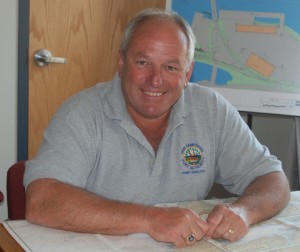Posts Tagged ‘5 Questions’
Friday, April 8th, 2016
The first New Hampshire Aerospace and Defense Conference last year was a sell-out. It marked the first time some of the state’s 300 businesses involved in these fast growing industries had the opportunity to meet one another and see the impressive scale of aero/defense in the state. The 2nd annual conference is set for June 1 at the Radisson Hotel in Manchester and it really will be the must-attend event for companies within New Hampshire, as well as though around the Northeast. Sean Foote, supply chain manager at Transupport Inc., in Merrimack, is a board member on the conference committee and provides an overview of this year’s event.
 Sean Foote ~ NH Aerospace and Defense Conference 2016 1. Before we get into the details of the New Hampshire Aerospace and Defense 2016 Conference, can you give us a quick overview of the New Hampshire Aerospace and Defense Export Consortium?
The consortium was started through a grant in 2013 by the New Hampshire Office of International Commerce. Since then, it has grown to include members from the aerospace and defense industry, as well as service providers that complement these enterprises. Last year, NHADEC became a non-profit organization status and hosted its inaugural New Hampshire Aerospace and Defense conference. Earlier this year, it was recognized by the NH Business Review, earning a Best of Business Editors Award as a ‘state initiative that really took off.’
The biggest benefit of NHADEC is the partnerships it has with the New Hampshire Manufacturing Extension Partnership and the state’s Department of Resources and Economic Development and its Office of International Commerce. OIC, for example, educates NHADEC members on the benefits of export promotion grants and sponsored trade shows to help these companies expand into international markets and drive down the cost incurred if a company were to make this plunge on its own. NHADEC members also have the opportunity to receive training on various aspects of international business, from commercialization and branding to export control and ITAR regulations.
 Last year’s NHAD conference was a sell-out. Reserve your space today. 2. Last year’s aero/defense conference was a tremendous success. What’s new for this year’s event?
The NHAD conference committee is excited about a few changes in this year’s event. Through feedback from last year’s conference, we extended it from a half-day event to a day-long networking and collaborative event.
The theme this year is Opportunities for Aerospace and Defense Products, Technologies, and Services in the International Marketplace and we have scheduled a variety of presentations and break out discussions to cover this important topic. For example, we plan on having a presentation covering foreign military sales to bring us up to date on the status on foreign countries procurement. Another highlight will be the break out discussions covering key growth in world markets, such as Colombia, the United Kingdom, Canada and Saudi Arabia.
With the extended hours this year, attendees will have more time to visit the exhibitors. Last year, we had nearly 250 people attend; we had to turn away another 100 people. The venue for this year’s conference is the Radisson Hotel in Manchester and expect to have an even better turn out than last year.
3. Tell us who should plan to attend the conference; is it open to aero/defense companies outside of New Hampshire?
Yes! The NHAD conference committee invites companies outside of the state to attend, which will give the event a more regional appeal. The companies that should be signing up to attend this conference are aerospace and defense enterprises that develop products, technologies and services for the industry. With the theme highlighting opportunities in the international marketplace, companies should sign up if they are looking to take-off into exporting, or looking for local manufacturers to deepen their international supply chain.
Service providers may also consider registering for the conference introduce themselves to a variety of businesses who all have different needs, such as legal advice, business insurance, website or marketing developer.
4. Why is there such a buzz about aero/defense in New Hampshire?
Since the beginning of aviation, New England has always been the hub for aerospace. Many of the major OEMs got their start not too far away, in Connecticut. Since then, companies have been bought out or merged and factory plants have been relocated, but the one constant is the vast number of SMEs that support the aviation industry that have stayed in the region.
In the past few years, New Hampshire has received a lot more buzz because it is one of the leading exporting states in the country for the aerospace and defense industry. People are starting to notice and it’s through the help of the state’s Department of Resources and Economic Development and organizations like NHADEC that the state is earning this recognition.
5. What are the details on deadlines, where to sign up and where to go for more information?
Registration is now open and it’s first come, first served. The deadline to register as an exhibitor is May 18 and May 31 for those who want to attend. For more information about being an exhibitor, or to register, go to the conference website.
Tags: 5 Questions, aero/defense industry, NH Aerospace and Defense Conference, NH Aerospace and Defense Export Consortium
Posted in NH Business Matters | Comments Off on 5 Questions with Sean Foote, NH Aerospace and Defense Conference 2016
Friday, April 1st, 2016
 Michael Bergeron, senior business development manager Every day, our business development managers, Michael Bergeron and Cynthia Harrington, speak with site selectors and business owners from around the country searching for the right place to expand or relocate their companies. Their reasons are varied – some may have a deep affinity for the Granite State, while others are drawn to our business friendly climate and educated workforce. Michael talks about the process involved in the expansion/relocation of a company.
1. Business recruitment is an important part of economic development, as it facilitates job creation, encourages growth and diversifies the New Hampshire economy. What’s a typical day like in the life of business development?
We are a sales office for the state, so the priority every day is increasing our pipeline of qualified leads and once we have a strong lead on an interested company, we work with it, confidentially helping the company locate or expand in the state. We market each region of the state differently, based on the region’s strength and assets.
Each part of the sales cycle requires different needs, ranging from cold calls, research, writing proposals comparing New Hampshire with other states, making presentations to decision makers, facilitating meetings with other agencies such as the governor’s office, the Department of Environmental Services and the Department of Transportation; working with the University System of New Hampshire; the NH Business Finance Authority, the NH Community Development Finance Authority; contacting municipal officials; providing real estate tours and working on any issues that the company needs help with in ultimately choosing New Hampshire in which to expand or relocate.
We also work closely with local and regional economic development groups that are important in closing the sale. For example, I recently referred a company from Massachusetts to Jack Donovan of the NH Business Finance Authority, who was able to turn around an industrial bond loan within 40 days—a critical factor in landing the company in Hudson.
2. You’ve been a part of hundreds of business relocations and expansions in your tenure here at the Division of Economic Development. What is is about New Hampshire that draws companies here?
Currently in this market, the number one issue is the availability of skilled employees, followed by cost of occupancy and available office or industrial real estate. If any one one of these factors are missing, the transaction dies. If the company is a family-owned business, the decision is often affected by where its president lives, or wants to live.
And that decision by the owner, and his/her spouse, is predicated on a region with excellent schools, low crime, quality healthcare, cultural options, open space, easy access to major metro areas. Sometimes I have seen decision makers expand to New Hampshire because they have a summer home here.
If it’s a large national company looking for a branch location, then management wants to be close to Boston or Quebec and be confident it can hire managers, and lower the cost of occupancy, compared to the higher rents in the Boston market.
3. Earlier this year, the division unveiled its strategic plan, which identified a number of key industries. How is this helping business development?
The key industries’ clusters in New Hampshire can help attract similar companies that want to be part of the same cluster. For example, we have a growing aerospace cluster and bio/medical device cluster in New Hampshire. When we are on the road at trade shows, we show decision makers where these clusters are located, talk about the educational system that supports these clusters, and how we can help them locate employees and real estate. We understand the kinds of buildings needed for these uses and we can show where to find a good match for employees.
4. NH Economy is back on the road and will attend several trade shows this year. Can you tell us why it’s important to have a presence at them?
It is a myth that attending trade show provides instant leads; rather, it is a higher form of advertising, where we meet people face to face and develop business relationships over time. Finding the right venues and consistently attending is the key obtaining qualified leads. For example, I may meet site consultants at a show, but I may not work with them for another five years, after I develop trust and when an opportunity arises, they think of New Hampshire.
5. You speak with hundreds of companies every year that are considering relocation or expansion. Why is New Hampshire on their list of possibilities?
If they are companies from Massachusetts, Maine, or Vermont, they are looking to retain their current labor force in those states, and also find new employees, by staying within 30 to 50 miles of their current locations. If they are from outside New England, they are looking at New Hampshire because of our lower taxes, skilled work force, easy access to interstate highways and regional and international airports, and business friendly climate.
If it’s a large company, incentives are usually part of the evaluation. In these circumstances, New Hampshire competes with states like South Carolina, Texas, and Florida.
Tags: 5 Questions, business expansion, business recruitment, business relocation, Michael Bergeron
Posted in NH Business Matters | Comments Off on 5 Questions with Michael Bergeron, Division of Economic Development Business Development Manager
Thursday, March 24th, 2016
We’re well enough into the 21st century that once futuristic terms, such as broadband, connectivity, bits and bytes, are now part of our daily lives. Think of it: A generation has now lived in the era of technology – computers, cell phones, email, apps.
Today’s 5 Questions go to our own Carol Miller, who makes sure New Hampshire is on the forefront of technology.
 Carol Miller ~ Director, Broadband Technology 1. It’s nice to introduce you this morning. As the director of broadband technology, can you tell us what your role is?
My role at the Division of Economic Development is very diverse. My first responsibility is to support our recruitment and retention personnel and their clients with information on broadband availability, capacity and provider options within the scope of location selection, connectivity challenges, and technology. My other duties include tracking broadband statewide, and its effects on state economic development initiatives, and advocacy for the availability and utilization of high capacity broadband to the citizens of New Hampshire. I run a help desk for communities and citizens in need of broadband for the state, with referrals coming from the Governor’s Office, the Public Utilities Commission, legislators and economic development agencies. I manage the Governor’s Telecommunication Planning and Development Advisory Committee with the division, through a sub-committee structure that covers tele-health, education, adoption, deployment and agency goals and objectives. In addition, I represent the Department of Resources and Economic Development on FirstNet (public safety nationwide interoperable radio network)at the Department of Safety, school connectivity at the Department of Education and use of tele-health at the Department of Health and Human Services.
2. Broadband is one of those things we’ve come to expect in the 21st century. How does New Hampshire compare with the rest of the country?
New Hampshire, for the most part, is fairly well-connected compared to the rest of the country. Despite our status, there are many pockets in rural areas that need investment in infrastructure to support high speed capacity. Many areas only have access to one provider limiting service options and falling short of delivering the promise of innovation that broadband brings to a community. New Hampshire is considered a high tech state. Business and residents embraced technology early on. With some major federal investments nationwide, many states have improved their broadband availability and some of the playing field has leveled off considerably. New Hampshire is still at the forefront of the technology, typically scoring within the top 15 states for access.
3. Why is broadband so important for a state like New Hampshire?
The benefits of broadband can be correlated to jobs, economic growth, and cost avoidance for our residents and businesses. About 34 percent of new jobs is the result of broadband; about 1.2 million jobs have been created by the development of the internet over the last decade.
Broadband creates direct jobs with the deployment of infrastructure, indirect and induced jobs from the activity, and additional jobs as a result of network availability and spillovers.
4. What are the economic development benefits of broadband?
Broadband improves efficiency and productivity of business, increases community competitiveness by attracting knowledge-based businesses, and sparks new and innovative technologies, services, applications and business models. On the residential side access to broadband improves educational opportunities, access to tele-health services and increases opportunity for employment and household income.
Having access to broadband can impact household income by as much as $2,100 annually. Startups can save an estimated $16,500 by using broadband services. The Fiber to the Home Council found that companies with fiber connectivity saved about 20 percent on operating expenses. Electronic health records and remote access will save over $700 billion nationally over the next 10 to 15 years. Adequate broadband increases real estate values $5,000 to $6,000 and lack of it decrease real estate value up to 20 percent.
5. What’s ahead?
I will continue to provide support, advocacy, and consulting in the legislature and for communities in need of broadband working with public and private partners throughout the state to remove barriers. Broadband is essential and the availability, adoption, affordability and high speed capacity will be challenges for many years to come.
Tags: 5 Questions, broadband, Broadband Technology, Carol Miller, technology
Posted in NH Business Matters | Comments Off on 5 Questions with Carol Miller, NH Economic Development
Friday, March 18th, 2016
The Northern Border Regional Commission is a federal-state partnership with a mission to encourage economic development across a four-state region, including New Hampshire. Each year, grants are awarded to projects that reflect that mission. Eligible counties include Carroll, Coos, designated areas in Grafton, and Sullivan Counties. Our deputy director, Chris Way, coordinates applications and today talks about what you need to know to apply.
 Chris Way 1. The call is out now for the next round of grants offered annually by the Northern Border Regional Commission. For the past several years, you have coordinated the applications put forth by New Hampshire agencies and organizations. Can you tell us about the eligibility requirements to apply?
First, you do have to have a project that is eligible portions of the state, namely Sullivan, Coos, Grafton and Carroll. Grafton is a little more restrictive this year as only certain communities are eligible (called isolated areas of distress).
Next, you have to be a municipal, state or nonprofit entity. Private businesses are not eligible. That’s not to say there cannot be collaboration; it’s just that the grant can’t be a pass through to private companies.
Third, and not to state the obvious, you need to have a project that will actually work and can be done as proposed. Can you finish the project in the time allotted? Will you be able to secure the matching funds needed? Do you have the approvals necessary to make it work? We, and NBRC, focus on these issues, because with such limited funds, we need to make sure that projects can move as proposed and money spent wisely.
If you have questions about eligibility, particularly if you are in Grafton County, go to the website or call me.
2. What’s new this year about the process?
The program has certainly evolved over time, and this year, several exciting things are happening.
The NBRC has listened to the states and have a new website with online applications, forms and information on past grants. I am really pleased to see that FAQs are available online, because it was clear from previous cycles that all applicants had many of the same questions and challenges. Not only does it mean that New Hampshire applicants work with the same information, it also means that all four states, including New York, Vermont and Maine, are talking from the same playbook. The application is not hard, but many applicants in the past have stated that more published information would certainly make the process easier. This is also going to be reinforced with county-wide information sessions; the first one will be from 2 to 4 pm, April 1, at the 5th Circuit Court Probate Court Room, third floor, at 14 Main St., Newport. Stay tuned for others.
Did I mention more money available this year? It looks like we will be able to fund more projects with $1.7 million for each state. The $250,000 limit remains, but it does provide the grant review team with more flexibility. In fact, we had more money last year than the previous, and we were able to fully or partially fund seven great projects.
Finally, it’s also reassuring for me to know that NBRC staff stands ready to assist and partner with us on projects. These folks are passionate about the program and it has truly shown this year. Christine Frost, formerly of the North Country Council, recently joined the agency, which has really upped the game for the NBRC grant administration and its awareness of the issues in our eligible counties. The NBRC team has also done a bang up job to encourage all of our states to communicate and supportive of projects that benefit the Northern borders region.
3. What makes a good project for a Northern Borders Regional Commission grant?
Tell a good story! Tell us how your project will create jobs, improve tourism or have a regional impact. Why should your project be a priority for the state? Will it increase the workforce, create infrastructure, promote tourism or result in new businesses?
Let me offer a brief word on application size and letters of support. Sometimes we receive applications with huge packets of information. All well and good, but remember a concise packet that hits the high points and tells the story has as much an impact as stacks of information. Local support is certainly welcome, as are the key letters from all of the partners involved in the project, but strong thoughtful letters of support can be just as good as many letters saying the same thing. I guess what I am saying is that we tend to focus on the cake, and not just the frosting.
Everybody always wants to know how projects get decided. Once projects are deemed eligible, the packages are scored by a committee based on several criteria. Recommendations are made to the commissioner of the Department of Resources and Economic Development, who then makes recommendations to the governor.
Knowing that, what makes one project better than another? Often, we get really good projects, but they may be focused on a small group who will enjoy the results, or the results are hard to predict or assess. While they are definitely eligible, it can be difficult to rise to the top when there are other projects making a better case for regional and even statewide economic benefits. And no matter what, job creation is always a strong factor.
On the flip side, be realistic – don’t predict multitudes of jobs created if you can’t back it up with a convincing argument. Don’t offer matching funds proposals that cannot be realized come time to sign the contract. We’re going to be doing more work this year on assessing the past results and we all want great stories to tell.
4. Can you give one or two examples of projects that made a difference in their communities/regions?
Sure. We just visited one in Lebanon. Last year, River Valley Community College received a grant and one year later, the inside of the building looks fantastic. The applicants did exactly what they said they were going to do, and I have no doubt the project will be successful.
Another one is the Grafton County Enterprise Center in Plymouth. Business incubators are attractive contributors to the economy and can make great projects.
And while we’re talking about successes, I also have high hopes for the Groveton mill site and its water and sewer project. That’s just about completed and will be a key piece for this high priority development site.
5. For the person/agency in Coos, Carroll, Sullivan and selected communities in Grafton Counties with a project that could benefit from a Northern Borders Regional Commission grant, what should they do next?
Don’t keep your project a secret. Let us know about it so we can talk it out with you. We want to get all projects to a point of eligibility. We don’t want waste your time, but we don’t want potential great projects to be left on the table.
For more information, contact Way via email or call 271-2341.
Tags: 5 Questions, applications, Chris Way, distressed counties, Northern Border Regional Commission
Posted in NH Business Matters | Comments Off on 5 Questions with Chris Way, on Northern Border Regional Commission Grants
Friday, March 4th, 2016
One of the great things about living in New Hampshire is our neighbors, especially those who step up and plug a hole in the fabric of our communities. Such is the case with Mary Ann Kristiansen, executive director of the Hannah Grimes organizations in Keene. As a soap maker, farmer and businesswoman, she noted a shortage of markets in the Monadnock region for people like her and scarce programs for these producers to learn about entering – and succeeding – in these markets. So Hannah Grimes was born – or, we should say – reborn, and now, hundreds of producers, craftsmen, artists and professionals have access to those markets and programs.
 Mary Ann Kristiansen ~ Hannah Grimes Center for Entrepreneurship 1. Hannah Grimes is more than just a name for a marketplace featuring local products and an incubator that nurtures start-up businesses in Keene. Tell us about Hannah Grimes and why is she an inspiration?
Hannah Grimes was born in 1776 and married at the ripe old age of 30 to William Stoddard Buckminster. They built the farm and the home in which I live. She was not famous, but what she and her family didn’t make or grow, they bought from friends and neighbors. When I moved to the farm in 1991 and began growing and making things and meeting my wonderful New England neighbors who were doing the same, the lack of a market and business skills became readily apparent. It was before the buy local movement and it seemed like an obvious gap. So in a winding set of events, which generally mark the beginning of most entrepreneurial efforts, Hannah Grimes Marketplace was born. In Hannah Grimes’ time, the markets and skills to come to market were part of the everyday. Those skills and that infrastructure had all but disappeared and needed to be rebuilt.
2. It’s hard to believe the Hannah Grimes Marketplace is approaching its 20th anniversary. Its beginning was definitely a forerunner of the ‘local’ movement and it has really grown in two decades. Why is it important for a community to have a niche like the marketplace?
Having a visible hub like Hannah Grimes encourages people to give their business idea a try and makes it easy for customers to buy local. Friends and family often give a nudge to local artists, producers and growers to “go to Hannah Grimes.” It is a friendly market that offers all the know-how that you need to get started – and to grow if you want. For existing businesses, it can provide an additional market and the opportunity to learn and grow. It makes it easy for residents and tourists alike to buy locally-produced gifts and everyday items from over 300 producers.
3. Congratulations on the 10th anniversary of the Hannah Grimes Center for Entrepreneurship! What kind of businesses have been drawn to the center and what do they find there that contributes to their growth?
The Center for Entrepreneurship broadened our business support programs from local producers and growers to all businesses. We work with manufactures, builders, publishers, farmers, artists, service providers, film festival producers, software companies, marketing firms, lawyers, architects and a whole lot more. Here, as well as at the Marketplace, we provide a hub for businesses and nonprofits. They find kindred spirits and a very wide range of resources regardless of their size, stage or sector. As a small community, it does not make sense to specialize, and I think that is a good thing; we have a dynamic cross section of businesses that come here and that benefits everyone.
4. You have some plans for Hannah Grimes in 2016. Can you share them?
We are planning to purchase an 86,000-square-foot industrial building on Marlboro Street in Keene to create the Center for Innovation. In addition to providing more incubating space, it will provide a hub for a more regional approach to economic development and will focus on high quality job creation throughout the region. The City of Keene is rezoning Marlboro Street as an Innovation Zone and planning to upgrade the street. The building itself has some really cool spaces that range from advanced manufacturing space with giant cranes to nice office space. It is a great opportunity to focus on growth from both the startup perspective and by working with existing regional companies.
5. There’s much of which to be proud in the development of the marketplace and the incubator in the past 20 years. If you could have lunch with Hannah Grimes, what’s the one question you’d like to ask her?
I’d really love a tour of her farm and I’d love to cook that lunch with her. Only the house was remaining when I bought the property and I’d give just about anything to know how it looked. And I’d like to ask her how she spends her day, some gossip on the neighbors, what she grows, and if she could share some recipes. Whoops, was that four? I’d have a million questions for her.
Tags: 5 Questions, Hannah Grimes Center for Entrepreneurship, Keene, Mary Ann Kristiansen, Monadnock region
Posted in NH Business Matters | Comments Off on 5 Questions with Mary Ann Kristiansen, Hannah Grimes Center for Entrepreneurship
Friday, February 26th, 2016
The U.S. Small Business Administration’s New Hampshire District Office has a great, free program coming up that’s geared toward established business owners like Michelle McManus, of Benchmark Office Systems in Londonderry. She is a graduate of the Emerging Leaders Initiative, a seven month program (did we mention it’s free?) to help them continue on the path of sustainable growth. More information is available here, including the link to register and below is Michelle’s account of the program.
 Michelle McManus ~ Benchmark Office Systems 1. You’ve been a small business owner in Londonderry for 16 years. Could you tell us a little about it?
Absolutely, my husband and I started the business back in October 2000. We were working for a similar business in Denver, Colorado and decided to move east to start our own business and eventually start a family. We always had a business owner mentality (working all the time, forward thinking, what we could do to make the business run better, etc)
2. Even after 16 years, you continue to seek out programs that make you a better business owner, such as the SBA’s Emerging Leaders Initiative. What drew you to this particular program?
One of my customers had been involved in the program and she said I needed to get involved. As a business owner, you sometimes feel like you are on an island, yet forget other business owners are in the same boat. This intrigued me to step back from the day to day operations and focus on how to get better.
3. What surprised you about the training … what was your ‘a-ha’ moment and the most valuable takeaway?
The most important take away is that I need to not do everything myself, boy that’s hard! I learned how to re-focus my energy on hiring people that can do better at certain tasks than I can do. I had to “fire” myself from doing all the hiring and involve other people in my business to help me make those valuable decisions.
4. The Emerging Leaders Initiative is a free program, but it does require a time commitment. Was it worth it and why?
Time away from business still costs money, but you get out of it what you put into it. If you focus your efforts, you will gain invaluable insight and renewed focus.
5. What would you say to someone considering enrolling in the upcoming program, which begins in April?
If you think you can do it all, you can’t, well you can, but not forever. To become successful, you need to try and duplicate yourself or parts of yourself to achieve greater success. Invest the time in yourself and your business.
Tags: 5 Questions, Emerging Leaders Initiative, Michelle McManus, SBA
Posted in NH Business Matters | Comments Off on 5 Questions with Michelle McManus, Benchmark Office Systems
Friday, February 19th, 2016
 Jac Cuddy ~ Mt. Washington Valley Economic Development Council 1. What is your role at the Mt. Washington Valley Economic Development Council and what does the organization do for the Valley?
I’m the executive director of MWVEC, and I also serve as the president of Technology Village Realty Management, a subsidiary group created by the MWVEC Board of Directors to oversee the design, construction and management of the 80-acre Technology Village land parcel.
The MWVEC is the economic development resource for the Mt. Washington Valley and two towns in western Maine – Fryeburg and Brownfield. The council’s loan fund has been used to help create 83 business loans with a revolving balance of over $5 million to date. The council also built the Technology Village, which houses 12 businesses and was able to provide an affordable facility for Granite State College to purchase. Inn partnership with the college, we have been able to provide boot camp classes to the business community, with over 2,700 employees participating over the last five years.
2. You’ve been with MWVEC since 2001. In your experience, what is it about the Mt. Washington Valley region that makes it particularly attractive for businesses?
Residents in the Mount Washington Valley have an incredible work ethic, which translates into a productive workforce. The Valley has an incredible environment, rich in natural resources for people to enjoy. Business owners also have a lower overhead in operating costs, due to a lower wage scale compared to the southern part of the state.
3. Can you tell us about a recent big win or successful project launch in which the MWVEC was involved and what it will do for the region?
Our biggest windfalls recently have been both a Northern Borders Regional Commission grant, and a Community Development Enterprise grant. The Northern Borders grant provided the council the ability to extend Technology Lane another 500 feet, providing four shovel-ready lots with infrastructure and are shovel ready. The Enterprise Grant is allowing the Council to provide technical assistance to more small businesses in the Valley.
4. Putting yourself in the shoes of a business considering moving or expanding to the Mt. Washington Valley from out of state, what are 2-3 things they should be planning for to make the transition easy, and how does the MWVEC help with them?
The council is willing and able to help a business that would like to relocate to the area. An ombudsmen will help to get through all the permitting process both locally and on a state level.
5. What’s new, exciting, coming up soon for MWVEC?
As a result of the success of the Northern Borders Grant, we’re already moving to put the four newly available lots into use. We’re currently working with a business that is looking to build on one of the lots in late 2016.
Tags: 5 Questions, Jac Cuddy, Mount Washington Economic Development Council
Posted in NH Business Matters | Comments Off on 5 Questions with Jac Cuddy, Mt. Washington Valley Economic Development Council
Friday, February 12th, 2016
A premier location. An airport. Land – and enough of it – for industrial development. Major improvements taking place where Interstate 93 runs through it. And beer. We caught up with Will Stewart, president of the Greater Derry Londonderry Chamber of Commerce, who filled us in on what’s happening and what’s ahead in this region.
 Will Stewart ~ Great Derry Londonderry Chamber of Commerce 1. Derry-Londonderry is one busy place these days, which is great to see. The region had a great piece of news at the end of 2015, with the ribbon cutting at Pettengill Road. What’s all the excitement about there?
It sure is busy place, and the newly-opened Pettengill Road is at the epicenter of the excitement right now. The road itself is less than a mile in length, but it opens up nearly 1,000 acres to industrial development, right alongside Manchester-Boston Regional Airport and between Route 3 and Interstate 93. This is the biggest single economic development opportunity in the state since the creation of the Pease International. About 1.2 million square feet has already been built, or is under construction there, with more in the pipeline. This is truly a case of “if you build it, they will come.”
2. The latest 10-year transportation plan recently submitted by Gov. Hassan includes plans for Interstate 93 and Exit 4A. How important is this for the communities?
It’s huge. Exit 4A is going to be a game-changer for the entire region, but especially for the towns of Derry and Londonderry. Like Pettengill Road, Exit 4A will make possible new development opportunities, including the Woodmont Commons planned unit development. Spanning 629 acres, Woodmont Commons will be a vibrant mixed-use urban village – a town within a town – featuring shopping, dining, entertainment venues, as well as residential, office, educational, and medical facilities.
3. Travelers coming north from Massachusetts and points south on I-93 pass through Greater Derry Londonderry. What are some reasons for people to take a break and spend some time?
This is a great spot to break up a trip, whether for a day, an afternoon, or just an hour or so. For those in a hurry we have great restaurants that are just off the interstate. For those who have a little more time, we have some of the state’s best apple orchards and pick-your-own farms, not to mention standout attractions like the Robert Frost Farm, the Aviation Museum of New Hampshire and Tupelo Music Hall. The greater Derry-Londonderry region also boast the state’s longest section of paved rail trail, which attracts bicyclists and others from surrounding towns and even surrounding states.
4. The area is such a great location for businesses and industry, but it’s also a great place to live. What’s your favorite story about a business inspired by the unique opportunities here?
Back in 2013, Melanie Davis and Carmel Shea were at the end of their bicycle ride on the Derry Rail Trail. Hungry and thirsty, the two friends looked around downtown Derry for some place they might be able to grab a snack and an iced coffee.
And while they saw plenty of great restaurants and lunch spots in downtown Derry, Davis and Shea said they didn’t see any coffee shops, or any other downtown establishments where they would be comfortable entering clad in bike gear and carrying their helmets. So in true entrepreneurial fashion, the two set out to solve the problem they encountered.
Such was the spark for the opening The Grind Rail Trail Cafe, a community-focused, bicycle-themed specialty coffee bar in historic downtown Derry. Today, The Grind is one of the most popular spots in town (and my favorite out-of-office meeting spot).
5. We’ve talked about transportation, commerce and lifestyle. But we need to talk about beer. What’s up with the brew industry?
Yes, we absolutely do need to talk beer. Much to the delight of area residents and those passing through, the towns of Derry and Londonderry boast four – yes, four! – craft breweries and one meadery. And they’re all within a stone’s throw from both one another and Interstate 93. I’m not aware of any other place in the state (or elsewhere for that matter) that has that high of a concentration of breweries so close together. The region also boasts a bevy of other brew-related businesses, from one operating a portable canning line to one specializing in the installation and maintenance of draft beer lines.
Tags: 5 Questions, Greater Derry Londonderry Chamber of Commerce, Pettengill Road, Will Stewart
Posted in NH Business Matters | Comments Off on 5 Questions with Will Stewart, Greater Derry-Londonderry Chamber of Commerce
Friday, February 5th, 2016
Part of the growing local movement in the United States is an awareness that people can invest their dollars in ways that positively affect their communities, while also earning a return. Throughout this year, three Granite State institutions−Live Free & Start, the New Hampshire Charitable Foundation and the New Hampshire Community Loan Fund−are teaming up to present a series of forums called Impact Investing in New Hampshire. We asked one of the presenters, Community Loan Fund VP of Economic Opportunity, John Hamilton, about the series. You can visit the Live Free and Start website to see the schedule and register for one or more of the events.
 John Hamilton ~ Community Loan Fund 1. Impact investing will be the topic of a number of forums around the state this year. What is impact investing?
Many people are familiar with “socially responsible investing,” which avoids investments in certain industries or activities that the investor finds objectionable.
Impact investing is a more intentional approach for the investor that seeks to support specific social or environmental outcomes—such as more good jobs in New Hampshire— and earn a financial return.
A common misconception is that impact investing doesn’t provide a positive financial return. However, recent reports and years of investments show that impact investors don’t have to sacrifice earnings.
So we’re excited to partner with Live Free and Start and the New Hampshire Charitable Foundation to bring this information to current and prospective investors across New Hampshire. We’re holding six Investing in NH forums in which each of the organizations will present various ways individuals can have a positive impact on the people and businesses of the Granite State through impact investments.
2. How important is this kind of investing to the state’s business ecosystem?
Impact investments can be more flexible, timely and risk-tolerant.
Flexible because impact investments often come from private sources–individuals and foundations–and without a lot of restrictions. They can deliver a range of types of capital (debt, sub debt, royalty and equity).
Timely because these investors can shape their capital to the needs of the business and react more quickly than traditional financing sources.
Risk-tolerant because some impact investors are willing to take greater risk if there is an opportunity for better returns, particularly if the investment would benefit New Hampshire’s people, communities and economy.
3. Can you give an example of where impact investors made a difference in New Hampshire?
In 2013, Rustic Crust, a natural pizza product company based in Pittsfield, needed growth capital to get its product into more grocery stores throughout North America. The Community Loan Fund had made a previous royalty investment and wanted to support this growth, but the company needed more financing than we could provide at the time.
Fortunately, we knew of an individual who was interested in co-investing with us. Together, we provided the needed capital, and Rustic Crust has since nearly doubled its number of full time jobs, while also increasing its part-time workforce.
This is particularly satisfying because a fire destroyed Rustic Crust’s production facility not long afterward. Yet because of strong management and community support, including from the company’s investor, Rustic Crust is thriving.
4. From the outside looking into New Hampshire: Will encouraging this form of investment draw more businesses or start-ups to the state?
We hope that the number and appetite of angel investors here encourage start-ups and businesses looking to relocate. There are definitely investors seeking out those kinds of opportunities.
And inasmuch as a goal of encouraging businesses to relocate or start here is to increase the number of good jobs, that goal aligns perfectly with those of many impact investors.
We know one of the motivations of some impact investors is to keep their money local. They enjoy financing projects they can drive past and feel the “I’m glad I put my money there” glow. There are many strong businesses already in New Hampshire, owned and run by our neighbors and friends, which are ready to grow and only lack the kind of flexible capital I described earlier.
5. Aside from attending one of the forums taking place throughout the state from now until the end of the year, is there a place where people can get more information or speak with someone?
The forums offer a rare chance to share the perspectives, experiences and opportunities offered by three organizations, so we hope that anyone interested in finding out what it means to be an impact investor will attend one of them. You can see the schedule and register here.
The next best option is to visit the web sites of the three participating organizations: Live Free and Start, New Hampshire Charitable Foundation and New Hampshire Community Loan Fund. You’ll find a range of local and regional opportunities. That’s a good thing−for the Granite State and for New Hampshire investors.
Tags: 5 Questions, impact investing, John Hamilton
Posted in NH Business Matters | Comments Off on 5 Questions with John Hamilton, New Hampshire Community Loan Fund
Friday, January 29th, 2016
Portsmouth, home to a deep water port, has centuries-long experience in dealing with ships and commerce, making it one of the oldest working ports in the country. The Port of New Hampshire is tremendous asset for many industries, including Granite State companies sending their products to markets around the world.
Today, we’re meeting Geno Marconi, director of the New Hampshire Division of Ports and Harbors.
 Geno Marconi ~ NH Division of Ports and Harbors 1. The Port of New Hampshire is the Granite State’s ‘Gateway to the World.’ How much cargo flows through the port annually?
The port as a whole handles about four million tons of cargo annually. This includes the seven terminals on the river that have 16 businesses utilizing them. According to The Economic Impact of the Piscataqua River and the Ports of Portsmouth and Newington study, 987 jobs paying $90.2 million in wages and benefits were directly employed by those 16 businesses (not including Portsmouth Naval Shipyard – ed.). Regionally, port-related activities include 2,357 jobs (2,078 in NH and 280 in Maine) paying $156 million in income, with $274.5 million in value added. In addition, $25 million in state and local taxes are generated as a result of these activities.
2. Part of the mission of the Division of Ports and Harbors is to stimulate the economy and create jobs. How does it do that on a day-to-day basis?
The Port Authority is involved in several different aspects:
- We operate the state-owned Market Street Marine Terminal, the state’s only public access general cargo terminal, and we provide the opportunity to businesses that want to move merchandise in and out of the area. The terminal also supports activities at all the other terminals, including the Port’s Naval Shipyard. Materials and equipment for those other facilities are often transloaded from here;
- We operate the commercial fish piers in Portsmouth, Rye and Hampton, providing a platform to the fishing industry. Additionally there are charter fishing, whale watch, and tour vessels that operate from our facilities in Portsmouth, Rye and Hampton;
- We oversee the dredging of the harbors and channels in order to keep commerce moving. We are now partnered with the Army Corps of Engineers in a $23 million project to expand the uppermost turning basin of the Piscataqua River.
3. What are the advantages of using the Port of New Hampshire for freight shipments?
It all depends on the cargo and tee destination. Each cargo opportunity receives personalized attention depending on the needs. For example: An oversized piece of equipment that may be on a ship bound for NY with a final destination in Bedford, NH, would have great difficulty getting over-the-road permits through some states. Many times we have put these types of cargo onto a barge and brought them here at the state pier.
4. NH also has five Foreign Trade Zone sites and two subzones, and the DPH serves as the FTZ grantee. How do these FTZs benefit the New Hampshire economy?
Simple answer: The companies would go someplace else if we didn’t have them. (An FTZ offers tariff and tax relief to New Hampshire exporters, which lowers their costs and increases employment, capital investment and revenue opportunities. FTZs are supervised by U.S. Customs and Border Protection, a division of Homeland Security. -ed.).
5. Is there anything new or exciting happening with the port and its operations, or projects happening in the coming months?
The exciting projects are the Sarah Long Bridge (to straighten the navigation channel, which will allow larger ships to access the port; and to increase the vertical clearance, allowing taller ships to pass and reduce bridge openings) and the Turning Basin, also to allow larger ships to access the port, both long overdue navigation safety and improvement projects. Once these are done, we are looking at attracting new cargo here at the Port Terminal.
Tags: 5 Questions, Division of Ports and Harbors, Geno Marconi, Gino Marconi, Port of New Hampshire
Posted in NH Business Matters | Comments Off on 5 Questions with Geno Marconi, Port of New Hampshire
|




















